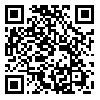دوره 8، شماره 3 - ( تابستان 1401 )
جلد 8 شماره 3 صفحات 176-167 |
برگشت به فهرست نسخه ها
Download citation:
BibTeX | RIS | EndNote | Medlars | ProCite | Reference Manager | RefWorks
Send citation to:



BibTeX | RIS | EndNote | Medlars | ProCite | Reference Manager | RefWorks
Send citation to:
Mazhari R, Farhangi A, Naderi F. The Relationship Between Psychological Vulnerability and Psychological Capital and Health Anxiety Through the Mediating Role of Emotional Processing in Nurses Working in the COVID-19 Units. JCCNC 2022; 8 (3) :167-176
URL: http://jccnc.iums.ac.ir/article-1-362-fa.html
URL: http://jccnc.iums.ac.ir/article-1-362-fa.html
The Relationship Between Psychological Vulnerability and Psychological Capital and Health Anxiety Through the Mediating Role of Emotional Processing in Nurses Working in the COVID-19 Units. نشریه مراقبت پرستاری مددجو محور. 1401; 8 (3) :167-176
چکیده: (2248 مشاهده)
Background: Nurses working in COVID -19 units during the pandemic are more likely to be psychologically vulnerable. The present study aimed to investigate the relationship between psychological vulnerability and psychological capital and health anxiety through the mediating role of emotional processing in nurses working in the COVID- 19 units during the pandemic.
Methods: This is a cross-sectional, correlational study using Structural Equation Modeling (SEM). The statistical population of the research was all nurses working in the COVID-19 units of Shiraz City, Iran in 2021. Five hospitals in Shiraz were randomly selected and then, 200 nurses were selected from their COVID-19 units through multistage random sampling. The data were collected by Symptom CheckList-90-Revised (SCL-90-R), the Psychological Capital Questionnaire (PCQ), the Health Anxiety Inventory (HAI), and the Emotional Processing Scale (EPS), and analyzed by AMOS-25 using SEM and Pearson correlation coefficient. The significance level of 0.05 was considered.
Results: The results of the SEM suggested that the proposed model fits the data. The results showed a direct relationship between health anxiety and psychological vulnerability (β=0.49; P=0.011). Moreover, there was a negative relationship between psychological capital and psychological vulnerability (β=-0.53; P=0.002), emotional processing and psychological vulnerability (β=-0.67; P=0.031), and health anxiety and emotional processing (β=-0.48; P=0.001). The direct path of psychological capital and emotional processing was not confirmed and eliminated from the final model. According to the results, there was a significant indirect path from health anxiety to psychological vulnerability through the mediating role of emotional processing (P=0.001).
Conclusion: Psychological capital and emotional processing could reduce the psychological disturbances caused by working in COVID-19 during the pandemic. Therefore, increasing nurses’ psychological capital and improving their emotional processing skills are suggested.
Methods: This is a cross-sectional, correlational study using Structural Equation Modeling (SEM). The statistical population of the research was all nurses working in the COVID-19 units of Shiraz City, Iran in 2021. Five hospitals in Shiraz were randomly selected and then, 200 nurses were selected from their COVID-19 units through multistage random sampling. The data were collected by Symptom CheckList-90-Revised (SCL-90-R), the Psychological Capital Questionnaire (PCQ), the Health Anxiety Inventory (HAI), and the Emotional Processing Scale (EPS), and analyzed by AMOS-25 using SEM and Pearson correlation coefficient. The significance level of 0.05 was considered.
Results: The results of the SEM suggested that the proposed model fits the data. The results showed a direct relationship between health anxiety and psychological vulnerability (β=0.49; P=0.011). Moreover, there was a negative relationship between psychological capital and psychological vulnerability (β=-0.53; P=0.002), emotional processing and psychological vulnerability (β=-0.67; P=0.031), and health anxiety and emotional processing (β=-0.48; P=0.001). The direct path of psychological capital and emotional processing was not confirmed and eliminated from the final model. According to the results, there was a significant indirect path from health anxiety to psychological vulnerability through the mediating role of emotional processing (P=0.001).
Conclusion: Psychological capital and emotional processing could reduce the psychological disturbances caused by working in COVID-19 during the pandemic. Therefore, increasing nurses’ psychological capital and improving their emotional processing skills are suggested.
| بازنشر اطلاعات | |
 |
این مقاله تحت شرایط Creative Commons Attribution-NonCommercial 4.0 International License قابل بازنشر است. |





